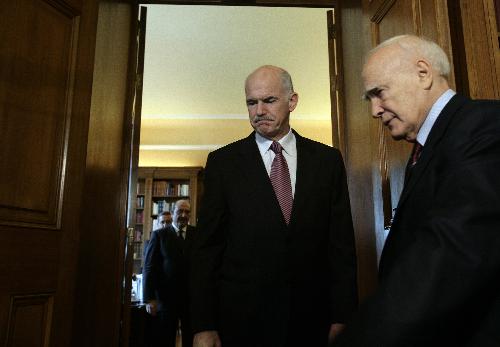Greece announces new austerity measures
The Greek government on Wednesday announced its renewed package of austerity measures expected to defuse a government debt crisis.
 |
|
Greek Prime Minister George Papandreou (L) reported to President Karolos Papoulias on the new austerity measures to be taken in a bid to slash down the double-digit deficit by 4 percentage this year. [Marios Lolos/Xinhua] |
"The decisions made today during the cabinet meeting this morning were hard, but we choose to implement them before circumstances impose them on us," government spokesperson Giorgos Petalotis said while announcing the measures.
The new austerity measures, aimed at saving 6.5 billion U.S. dollars, include a 30-percent cut in their holiday bonuses for civil servants.
Tax hikes of two percentage points are imposed on fuel, cigarettes and value-added tax, up from 19 percent to 21 percent.
The government also decided to impose a special tax on luxury goods such as cars of a value of more than 35,000 euros (47,800 dollars).
The measures also include an urgent tax of one percent of revenues of Greeks who gained more than 100,000 euros (136,600 dollars) in 2009 and a 45 percent tax on revenues above 100,000 euros that will be declared in 2010.
The government has also decided to implement a special tax on luxury goods such as cars of a value of more than 35,000 euros, as well as yachts and helicopters.
The decision to freeze pensions was one of the measures which caused strong reactions, even before it was formally announced by Petalotis.
Around 200 pensioners gathered outside the presidential palace on Wednesday noon to protest the idea, as Prime Minister George Papandreou was heading there to brief President Karolos Papoulias on the measures.
The new plan was worked out in a lengthy cabinet meeting earlier in the day. Now, the new package will be put before the Greek parliament for urgent approval, so the government can start implementing it as soon as possible, the government spokesman, Petalotis, said.
Speaking to reporters after meeting Papoulias, Prime Minister George Papandreou said tough decisions were being taken at a difficult time for the country and Greek is expecting "European solidarity."
"These are hard times, but what we have decided is necessary. We took tough decisions in a difficult situation," Papandreou said. "We are showing that Greece and the Greek people can responsibly take decisions."
"We justly expect European solidarity, and that is the other side of this deal," said Papandreou, referring to his bid for support from other European Union countries.
Analysts in Athens say the Greek government has put pressure on the European Union for aid ahead of Papandreou's visits to Berlin on Friday and to Paris on Sunday. The prime minister will also travel to Washington next week.
Papandreou received invitations from German Chancellor Angela Merkel and U.S. President Barack Obama earlier in the week, and his trip to France for talks with French President Nicolas Sarkozy was formally announced by the Greek government on Wednesday.
During the cabinet meeting, which was held behind closed doors, Papandreou warned that Greece would turn to the International Monetary Fund in case the country did not receive appropriate support from its European Union partners.
 0
0 






